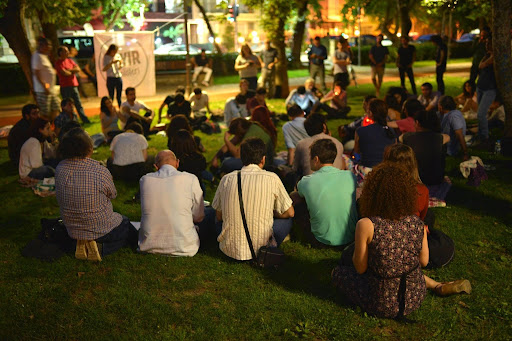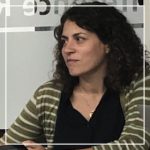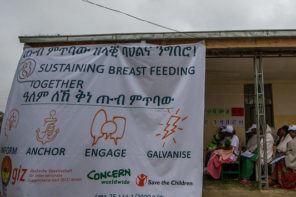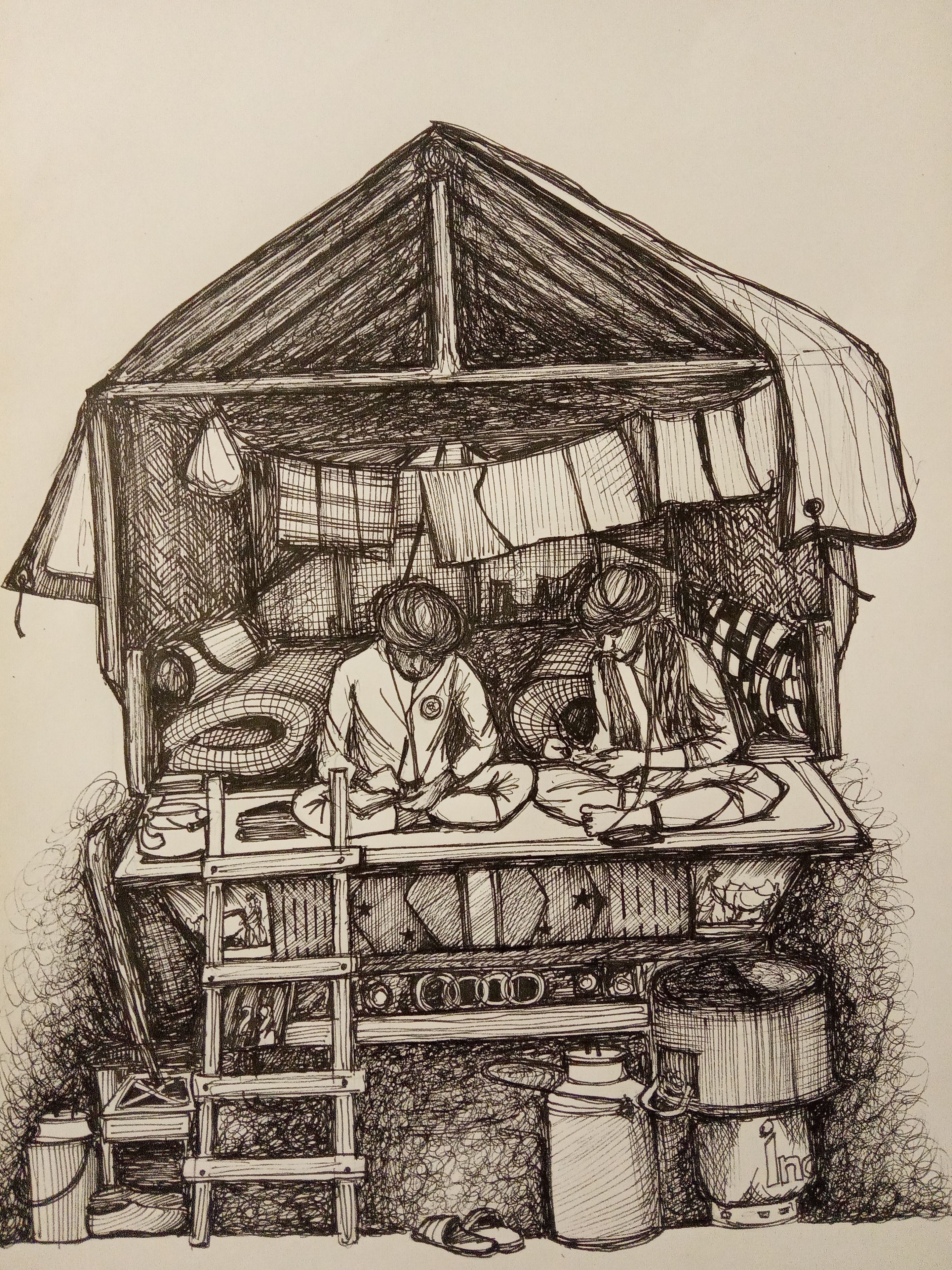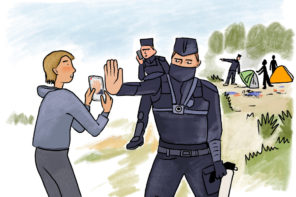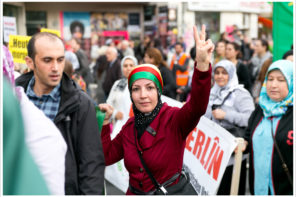Working in political environments that run counter to our personal values and commitments, and with people who are challenging these contexts in different ways, led us to think about “defiance” as both a common aspect of our ethnographic encounters and as a research ethos. We are four ethnographers who live in, work from, and move between Germany, Greece, Italy, Lebanon, Tunisia, Turkey, and the United Kingdom. Here, we draw from our experiences and fieldwork around the Mediterranean, in conversation with training and thinking developed in universities based in northern Europe, to explore the significance of defiance for ethnographic endeavours.
By this, we do not mean to imply that “defiant engagements” within and against political mainstreams are region-specific, nor that defiance is an exclusively left-wing tool. Indeed, at the Reflections on Political Engagement workshop where we met, “defiance” permeated life from Kashmir to Algeria, from Thailand to Ecuador. So did rising authoritarianism, xenophobia, nationalistic and identitarian politics, and counterrevolutionary turns. In our field sites and in places from which we write, teach, and reflect, these contexts have shaped the political and ethnographic possibilities available to us. While recognising that populist and far-right groups also often position themselves as defiant and anti-establishment, this post focuses on some of the different ways in which the people we work with (and so too ethnographers) defy oppressive conditions and try to challenge injustice. What follows is the result of our discussions on what defiance means, when, where, and how we encounter it, and how it can be mobilised methodologically and ethically.
Encountering defiance in the field
We approach “defiance” as part of both ordinary, quotidian politics and heightened moments of personal and collective political engagement. We ask, who defines a single act or a long-term commitment as defiant? And how can we engage ethnographically with (extra-)ordinary stances that run counter to prevailing legal and societal conditions?
Who defines a single act or a long-term commitment as defiant?
Valentina’s research participants’ defiance of the European Union’s border and its co-enforcement by Tunisian authorities was both manifest in everyday life and in specific events. Mothers who advised sons about whether to do the harga – the “burning” of the border by crossing the Mediterranean Sea without documents – did so knowing that they were defying laws imposing unjust restrictions on their social and physical mobility. Moments of concentrated activity, meanwhile, included local fishermen organising to prevent the docking in Tunisia of an anti-immigrant boat run by European far-right groups. Many of the people she came to know in south-eastern Tunisia, however, did not necessarily view this spectrum of actions as part of a broader politics of border “resistance” or “struggle”, and analysed their situation with regards to borders and mobility in a variety of (at times contrasting) ways.
Some, such as the fishermen, did think of their protest efforts as politically driven, leading them to collaborate on occasion with members of wider trans-Mediterranean networks of activists. Yet most young men and their families regarded the “burning” of the border as a necessity, and their defiance of EU travel regulations as a self-evident fact. Approaching the range of ways in which people live with the EU border as “defiant” helped Valentina identify commonalities between different people’s understandings of the border and of their actions and commitments without assigning a particular political colour, agenda, or uniformity to them. It also allowed her to inscribe herself within this array of defiant engagements as someone politically and ethically opposed to the EU border while acknowledging and staying true to the diversity of critiques that differently positioned interlocutors held regarding borders in her analysis.
Defiance can therefore be claimed by many different actors within the same field and at different political and social scales.
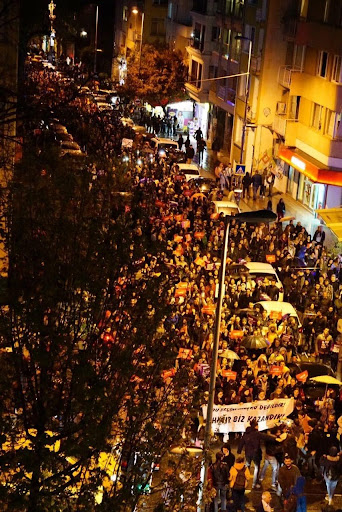
The banner reads “This referendum is not legitimate! No, we won!”. Photo: Anonymous, from the assemblies’ archive.
In contrast to Valentina’s context, Birgan’s research participants in Istanbul defined themselves overtly as defiant, political, and oppositional during a two-year-long state of emergency that blurred the boundaries between the everyday and the exceptional. The period of Birgan’s fieldwork as an activist-ethnographer, between the summer of 2016 and 2018, was a time of generalised defiance in Turkey that saw both sides of the political spectrum engaging in actions running “counter”, albeit for different political ends and at different scales. Right-wing followers of Erdogan defied the factions within the military who partook in the coup attempt; purged teachers and academics defied the laws by decree that led to the purges; the democratic public defied changes in the constitution that bolstered Erdogan’s powers; Kurds defied the curfews in Kurdistan, the state of emergency, and the state-appointed mayors that removed elected officials in Kurdish cities; hunger strikers defied death to live in a just society; women, workers, and minorities defied the deepening of patriarchal, exploitative, racist, and authoritarian politics; and Erdogan himself defied national resistance against his government’s increasing repression, defying international pressures and the constitution. Defiance can therefore be claimed by many different actors within the same field and at different political and social scales. As an act of opposing, resisting, rejecting – of saying “no” – we can see that the left does not have a monopoly over defiance: quite the contrary.
While keeping this plurality of defiant positions in mind as the context within which Turkish left-wing activists operated, the “no” campaign that Birgan became part of was constructed through the terms of defying injustice, disobedience, resistance, and solidarity, emerging from spontaneous individual gestures in the everyday to collectively organised acts of resistance, and everything in between. Local “no” assemblies were established to campaign against the amendments proposed by the 2017 constitutional referendum that aimed, and eventually (undemocratically) succeeded, to institutionalise an increasingly authoritarian regime in Turkey. Under these circumstances, the existence, name, and activities of the assemblies encapsulated the nature of their defiant engagement with authoritarian politics. Their commitment to democratic, egalitarian, inclusive politics defied their political setting. Simple activities like organising and attending protests, in this context, became acts of defiance-as-refusal.
But defiance can also manifest in paralysing inaction. Veronica’s experience of defiance-as-refusal arose from her encounter with the discourse of the “European Refugee Crisis” on returning to London in September 2015 from her fieldwork with a Syrian revolutionary community exiled in Lebanon. She was not an outsider to this “crisis”. In Lebanon, many of her friends had decided to risk their lives to leave. In the school in rural Lebanon where she worked, images of those who left circulated through social media – such as the death of the toddler Alan Kurdi – reminding everyone of present hardships. European media narratives about the “crisis”, depicting the spectacle of refugees as victims fleeing war, constituted a distortion of what Veronica had learnt – the dissonance between these parallel realities causing her anger and confusion. When a documentary filmmaker asked her to put him in touch with someone who went through the so-called “Balkan route” to get to Europe she said no, refusing to participate in the production of yet another portrait of the suffering refugee. Her refusal was an act of defiance vis-à-vis a European narrative obsessed with victimhood that erases the lived experiences of political struggles and their contradictions. And yet, how can this case of inaction be reconciled with her own work of representing (for a European academic audience) the life of the community she lived with, whilst doing justice to their viewpoints and predicaments? The challenge of integrating these two aspects became an intrinsic part of the writing of the ethnography itself.
The ethnographer and defiance
Veronica felt further discomfort with the concept of “victimhood, and a political economy of suffering tied to humanitarian discourses. Its paradigms clashed with the Syrian community’s articulation of life in exile in Lebanon. Remaining faithful to the community resulted in Veronica’s writing moving away from the figure of the victim as the ultimate political subject. Yet, certain fears and doubts remained. Is the possibility of writing a different story, and the political value of writing such a story starting in Syria rather than in Lebanon – and so starting with revolution rather than displacement – an act of defiance per-se? While rejecting the reification of the humanitarian subject, finding new words and narrative styles to represent a revolutionary exiled community encountering humanitarianism became also an exercise in defying a position of neutrality for the ethnographer and the temporal and geographical distance between “the field” and “the desk”. Defiance here involves accepting the ambivalent nature of political struggles while also taking sides, even in the act of writing.
Defiance can also be directed at dominant understandings of ethnographic fieldwork. Birgan’s fieldwork was marked by the classic dilemma of the participant-observer: the difficulty of balancing one’s participant self and observer self, the roles of activist/friend and researcher/academic. Birgan oscillated between listening as a fellow activist and listening as a researcher for whom the conversations, emotions, interactions, and silences were data to be gathered. In these instances, she set boundaries between her different roles and refused to record some gatherings which were in effect the extensions of her field site – like when the assembly moved to grab a few drinks after a long meeting. Although Birgan learned from, and therefore indirectly used, these interactions, they never found their way into her field notes as data. This establishing of boundaries was an ethical choice for her: in this way, her role as an activist/friend was not mixed with the more instrumental approach that the researcher might have while collecting data. This was her way of more honestly and openly being a part of the assemblies.
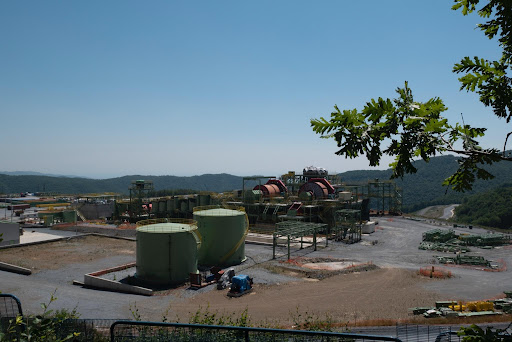
The site of the open pit gold mine in Megali Panagia, Northern Greece (June 2019). Photo: Evdokia Noula.
In contrast to Birgan’s and Veronica’s stances, Evdokia, reflecting back on her time as a Master’s student, did not feel able to take a defiant stance with regards to ethnographic fieldwork and knowledge production. In 2019, Evdokia set out for fieldwork in Megali Panagia, a village in Northern Greece which was divided over the opening of an open-pit gold mine close by. Before her arrival, she was warned about the civil war-like situation in the aftermath of the mining conflict. Yet she persisted in pursuing her initial research question of examining the future visions of locals from both sides of the clash, as she aspired to develop a well-grounded, holistic, and “objective” understanding of the mining conflict. Her intentions crashed, however, due to the time constraints and the precarity that invariably burdens student research.
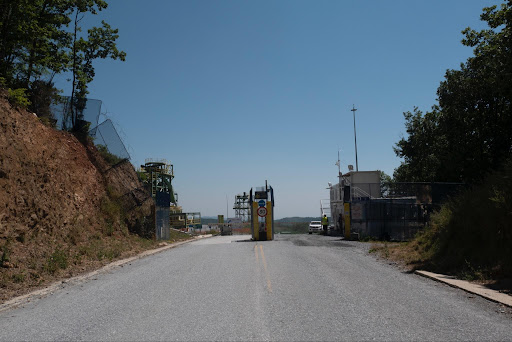
The entrance into the mine site in Skouries Forest: an entrance into an undesired future (June 2019). Photo: Evdokia Noula.
Even though her “hang-outs” with the members of the anti-mining movement could have given away her political opposition to the mine to other locals, she hesitated to take an open position. This also resulted in her making a choice for a more “balanced” analysis by neutralizing the conflict in the act of writing. Her brief fieldwork proved insufficient for engaging equally with both sides and finding a way to manoeuvre between the tensions regarding her research objectives and her political beliefs – although, as a home ethnographer, she was already familiar with the conflict’s context. This example suggests that sometimes compliance can be the only way to meet research objectives, and hints at the fact that the temporality of the researcher’s career imposes a hierarchy on the extent to which one can act in defiance vis-à-vis one’s fieldwork context. The plethora of positionalities we inhabit in the field ultimately impact on the possibilities (and limits) of politically engaged research, and thus blur the lines between defiance and compliance.
The temporality of the researcher’s career imposes a hierarchy on the extent to which one can act in defiance vis-à-vis one’s fieldwork context.
Conclusion
In our experiences of doing ethnography in politically-charged field sites, and through our different positionalities – ethnographer, friend, local, foreigner, writer, activist, and more – we all encountered defiance, although its forms, goals, agents, and content differed widely. Defiance – collective or individual; articulated as politically-motivated or as a necessity; carried out to challenge mainstreams in the field or within academic circles – is a puncturing of small holes in canvasses of power. In our current times, marked by the multiplication of populist leaders and authoritarian tendencies, the allure and uses of defiant postures, and who claims them for what purposes, become important questions not only for politicians and activists, but also for researchers.
Defiance – collective or individual; articulated as politically-motivated or as a necessity; carried out to challenge mainstreams in the field or within academic circles – is a puncturing of small holes in canvasses of power.
In this post we have shown how each of us thought with and engaged in defiance as we went about ethnographic research and writing. Across our different roles in the field and beyond we tested the edges of ethnographic and academic expectations. We are working within ethnography, but sometimes it is not a comfortable skin; it becomes constraining, so we try to stretch it. Ultimately, our ethnographic practices are entangled with the political contexts that make defiance an intrinsic part of our interlocutors’ lives, circularly and organically moulding our understanding of everyday and heightened forms of political engagement.
Image: Photo by Renee Fisher on Unsplash (Cropped)



